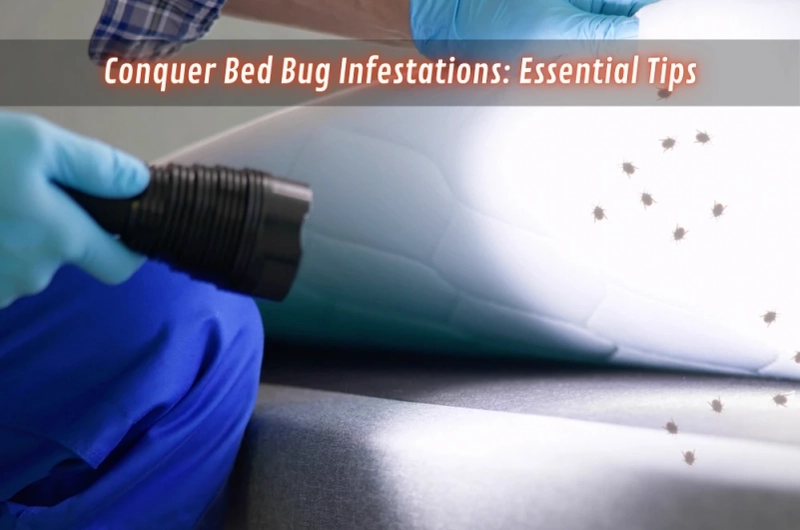Waking up with itchy red welts usually indicates an unwelcome guest in your bed: the pesky bed bug. These creatures - tiny and nocturnal - can turn your peaceful sanctuary into a nightmare. Bed bugs infestation can make living a very stressful moment, complicating sleep and causing anxiety. This article offers tips on tackling persistent pests called bed bugs - thereby providing a comprehensive guide on identifying, treating, and preventing bed bug infestations. Consider getting advice from pest control professionals, who are essential in delivering effective bed bug extermination Sydney companies offer for local homeowners. They can provide the first step toward recovering your home.
Detection and inspection: Detect bed bug refuges
Bed bugs are flattened, wingless insects of a reddish-brown colour. They feed off human blood and typically hide in locations where people sleep. They are frequently found in mattresses, box springs, bed frames, and other furniture components. Early detection is the hallmark of successful control; knowing what to look for makes immense differences in the outcome of treatment.
- Visual inspection: Search for live bed bugs, shed skins (exoskeletons), and small dark spots (faecal matter) on mattresses, bedding, and surrounding areas. Check all seams, tufts, and crevices.
- Bite marks: Bed bug bites are red, small, and itchy, usually in clusters or lines. However, the reactions to the bites vary highly from person to person; a few people are not even allergic to them.
- Musty odour: A heavy infestation may create a strong, musty smell.
It is something that needs to be done. Sydney's warm summers are usually conducive to insect breeding, making vigilance even more necessary. This is why knowledge about the signs and symptoms of bed bugs has become essential for Sydneysiders.
Chemical warfare: Effective treatment options
- Chemical treatment is highly effective if well applied to ensure the eradication of bed bugs. Different forms of insecticides are available; each has merits and demerits.
- Pyrethrins and pyrethroids: Pyrethrins are those pesticides derived from products of the flower chrysanthemum. Pyrethrins are lethal against several insects. Bed bugs come in this list.
- Desiccants: This group encompasses diatomaceous earth. These desiccants act through the drying of the insects. It is favoured, particularly for cracks and crevices.
- Insect growth regulators: The chemical here works as an, meaning it alters the development or growth cycle of insects so that they do not become mature insects.
It is essential to follow the instructions on any insecticide product. Too much or improper application can be ineffective and even dangerous. Professional pest control operators are trained in the safe and effective use of these chemicals.
Non-chemical remedies: Eco-friendly solutions
Various other nonchemical methods of managing bed bugs can be applied well for someone who is looking for more natural approaches. These are far better for someone who is hypersensitive to chemicals and can always be used hand in hand with chemical treatments.
- Heat treatment: Bed bugs are lethal when exposed for a long duration to temperatures beyond 50°C. This can also be achieved by using professionals for heat treatment or even merely washing and hot drying bedding and clothing.
- Steam cleaning is highly effective for killing bed bugs, including eggs, in mattresses, furniture, and any surface.
- Vacuuming: Deep vacuuming of the infested areas will help remove bed bugs and eggs. The vacuum cleaner bag must be sealed in a plastic bag immediately.
- Encasements: These materials cannot allow bed bugs to infest mattresses and box springs. They will get trapped inside and eventually die.
All these methods are highly effective if employed minutely to decrease or even eliminate bed bugs.
Prevention protocols: Protecting your home
Prevention is much easier than treating an established infestation. By taking precautions in advance, you reduce the probability of their appearance within your residence.
- Inspect second-hand items: Bed bugs in used furniture, mattresses, and clothing must also be inspected before being introduced into one's house.
- Be cautious when travelling: Before Unpacking, inspect hotel rooms for signs of bed bugs. Never put luggage on the floor. Install luggage racks in your rooms to avoid spreading the contamination into the area.
- Regular cleaning: Wash and dry bedding and clothing at high temperatures. Vacuum often, focusing on cracks and crevices.
- Sealed cracks and crevices around the walls, the floor, or furniture. Such areas prevent spaces where bed bugs may hide.
The above measures are essential to ensure that one avoids a pest infection.
Professional extermination: The final solution
On some occasions, DIY methods cannot work, so you are required to hire an exterminator. In addition, if your infestation problem is worse than you thought you could handle when using chemical applications, then that is the day to call them. Professional pest control operators have the knowledge, training, and equipment to get rid of different kinds of pests successfully. They can also provide priceless advice on how to protect your home from rodents and other infestations. In your research about pest control Sydney operators, ask if they have experience with bed bug extermination in Sydney.
Conclusion: Restoring a pest-free haven
Bed bugs can be challenging to eradicate, but with knowledge and a strategic approach, you can reclaim your home. Early detection, prompt action, and a combination of treatment methods are crucial for success. By implementing the prevention tips outlined above, you can significantly reduce the risk of future infestations. This information is particularly relevant in areas with warm climates, where pest activity can be more prevalent. Sharing experiences and insights can be invaluable to others facing similar challenges. Have you dealt with bed bugs in your home? What methods did you find most effective? Sharing your experiences in the comments below can help others create a more comfortable and pest-free living environment. For those in need of expert assistance, consulting with local professionals specialising in pest control is always a prudent step.



